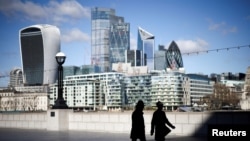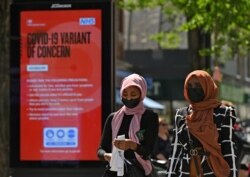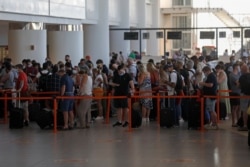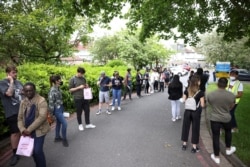When to unlock? Britain’s Boris Johnson is coming under mounting pressure from Conservative lawmakers and their allies in the media to keep to a previously outlined timetable that would see virtually all pandemic restrictions relaxed on June 21 in England.
But a sudden surge in coronavirus infections has triggered fierce counter-lobbying from the government’s scientific advisers, who want a delay to the final easing of restrictions to assess the latest data and to ensure that variants, including the now-dominant Delta variant, first detected in India, aren’t resistant to vaccines.
Ministers have been hinting for days of a delay in what was earmarked as the final unlocking phase, and government officials say they are in a race between vaccinating people and the Delta variant.
Businesspeople are also expressing frustration at any delay. Those angered by talk of delay include Andrew Lloyd-Webber, theater impresario and the composer of musicals, "The Phantom of the Opera" and "Cats." He issued a threat to the government Wednesday, vowing to risk arrest by reopening his London theaters on June 21. If the final stage of unlocking was postponed, “We will say, ‘come to the theater and arrest us,’” he told local media.
The Delta variant is at least 40% more infectious than the previous strain dominating Britain, say government advisory panels, and the surge in cases is being seen largely among the unvaccinated under-30-year-olds. Some government advisers fear Britain’s national health service won’t be able to cope once again, if the virus is allowed to run rampant, and are predicting cases requiring hospitalizations could reach the previous peak seen in January.
More than 12,000 Delta-variant cases have been identified, and of those 126 led to hospital admissions. Eighty-three of those hospitalized hadn’t been vaccinated, 28 had received one vaccine dose and only three had received both jabs. Britain recorded more than 6,000 new daily coronavirus cases midweek, up 68% in the past seven days.
Nonetheless, Cabinet ministers received a pessimistic briefing Wednesday from key advisers, Chris Whitty, chief medical officer for England, and Patrick Vallance, chief scientific adviser, with the pair telling the politicians that the latest data is “fairly grim,” according to Downing Street officials briefing local media.
Government sources say they expect that Johnson on Monday will likely announce a delay of “between two weeks and a month” to the phase four reopening, but they say they are optimistic that the political fallout won’t be too great as many restrictions were lifted last month with non-essential shops and malls allowed to open.
The government had planned to end on June 21 social distancing, dropping a one meter-plus rule between patrons of restaurants and bars. The rule of no more than six people gathering in homes would also be lifted, and nightclubs and discos would be allowed to operate. A 30-person limit on weddings would be lifted, and rules on wearing facemasks in public would be dropped. And the government would drop its guidance on people working from home, if their jobs allow it.
But traveling overseas for vacations is now being firmly discouraged after considerable government confusion and mixed messaging.
Earlier this week more than 10,000 British vacationers rushed back from Portugal, one of just a handful of countries Britons are permitted to visit without having to undergo ten days of self-isolation on their return. The British government had put Portugal on a “safe list” of countries just two weeks earlier but abruptly removed from the list this week.
On Tuesday former Conservative minister Steve Baker urged Johnson to go ahead and keep to the “freedom day” he had earmarked to “make life worth living” again. He called it the “last chance” to save Britain’s hospitality and tourism industries and said the time had arrived to allow people to “reconnect with family and friends and regain our mental health.”
Half of all adults in Britain have had both vaccine doses. And official government figures for England show that around four in five over-50s and a third of those in their 40s have had both jabs.
Those who oppose any delay point to the huge fall in deaths and hospital admissions, arguing that they prove vaccines have broken the link between infection and severe disease. They say government cautiousness is based on the adoption of a delusion — namely that the country, or any country, can be COVID-free.
“Scientists seem to be quietly advocating a zero COVIVD approach, wherein case numbers in themselves are deemed to be concerning even if they do not lead to an uptick in hospitalizations or deaths,” says the Daily Telegraph newspaper, which once employed Johnson as its Brussels correspondent. “They argue that the borders should be closed until global case numbers are brought down, for fear of new variants. This is the sort of New Zealand-style logic that would leave the country locked off from the world indefinitely.”
The newspaper complained that there is “an apparent failure to account for the costs of the lockdown measures when deciding policy” and “the worst predictions are always heeded” by the politicians.
“One day soon freedom will return,” Britain’s health minister Matt Hancock told lawmakers this week. “We must proceed safely and not see this go backwards,” he added.
Meanwhile, WHO’s special pandemic envoy, David Nabarro, has warned that the world will have to learn to live with the coronavirus and people will have to adapt their lifestyles, whether they are vaccinated or not. “I’m trying to really re-iterate it can’t just be about restrictions,” he said. “The future for humanity is that we adapt our lifestyles, so we make it hard for this virus to spread.”
Nabarro told Britain’s Sky News: “We know that [the virus] is constantly changing which means that although vaccination is a marvelous asset, it’s not going to be enough. We are going to have to continue to behave as though the virus is an ever-present threat.”
The White House Wednesday said it had set up working groups with a number of foreign countries, including Britain, to determine how to restart international travel safely. World leaders are to discuss the issue at the G-7 summit in Cornwall later this week.










